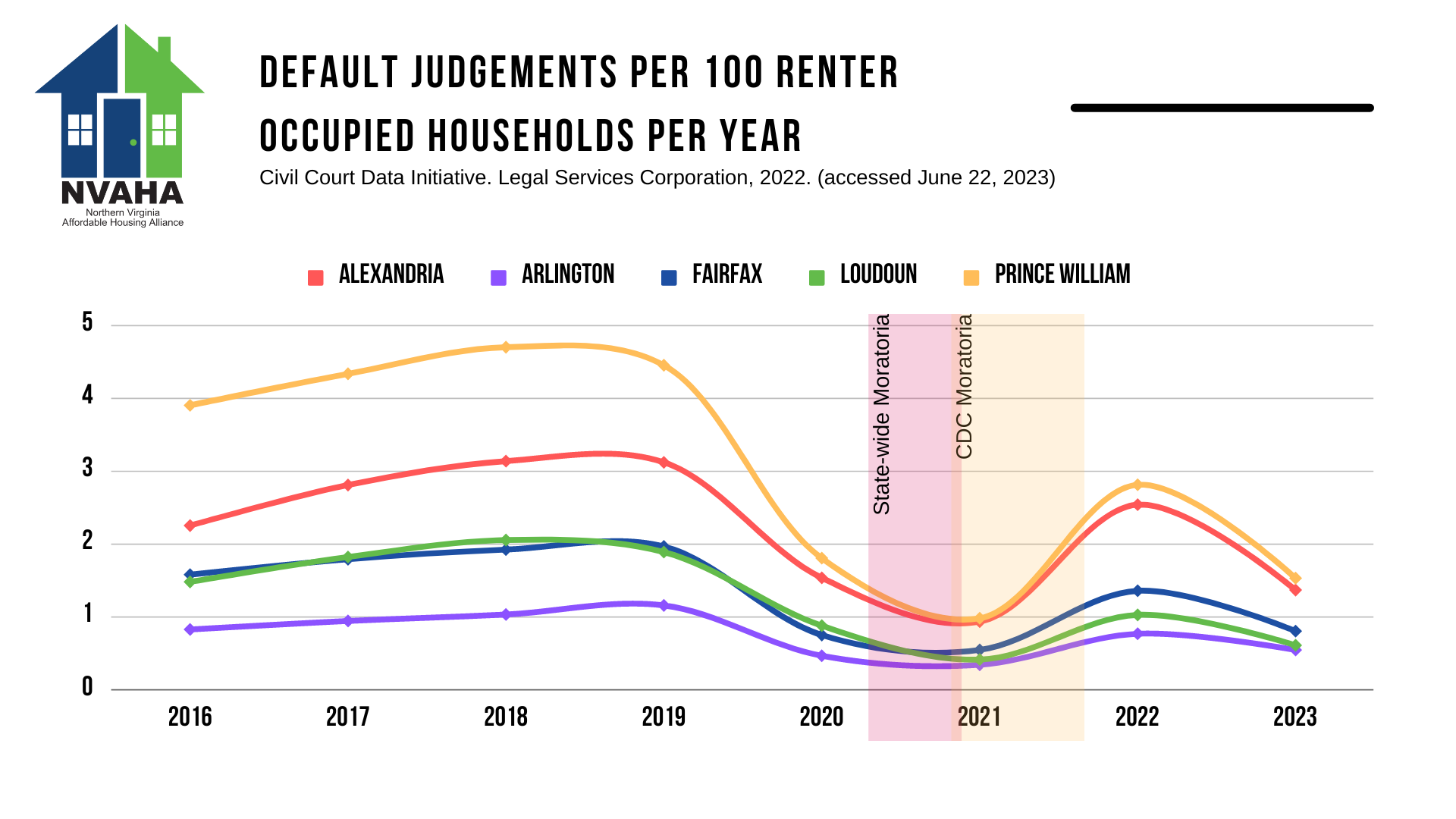This post was written by Hanna Metuda, Director of Policy and Programs.
Dear John,
Across Northern Virginia and the nation, eviction rates are rising, with some areas even surpassing pre-pandemic levels. This alarming trend is causing deep concern among local government staff, human service providers, tenant organizers, and advocates. As federal resources dwindle, individuals and families facing eviction are left with limited options—forced to either move out of the area, rely on the support of other families, or face the risk of homelessness. In this blog, we will explore the key findings and implications of eviction trends in Northern Virginia.
Eviction Trends and Data Sources:
Using data from the Legal Services Corporation's Civil Court Data Initiative, a clear pattern emerges. From 2016 to 2019, eviction filings in Northern Virginia were consistently high. However, heightened awareness of evictions led to the implementation of eviction prevention strategies and resource allocation in 2019, resulting in a gradual decline. Due to COVID-19, eviction filings were halted, due to moratoria and statewide protections.
The data reveal that eviction filings in Northern Virginia have increased by 0.07% above pre-pandemic levels, meaning approximately 1 in every 57 renter households in the region faced eviction filings in the first quarter of this year.

Default judgments, which occur when tenants fail to appear in court, lead to an automatic ruling in favor of the landlord. These actions have surpassed pre-pandemic levels with 1 out of every 3 eviction cases in the region resulting in a default judgment during the first quarter of this year.
Local Jurisdiction Highlights:
Examining each jurisdiction individually provides further insights into the eviction crisis in Northern Virginia. Please find the Spanish version here. We note that the data does not account for self-evictions:
- Alexandria: Eviction filings remain below pre-pandemic levels, with approximately 1 in every 37 renter households facing eviction filings in the first quarter of this year. About 3 in every 11 eviction cases resulted in a default judgment.
-
Arlington: Eviction filings have increased by 12.89% above pre-pandemic levels, impacting about 1 in every 88 renter households. Approximately 3 in every 10 eviction cases resulted in a default judgment.
-
Fairfax: Eviction filings have risen by 2.71% from pre-pandemic levels, affecting approximately 1 in every 69 renter households. About 3 in every 11 eviction cases resulted in a default judgment.
Loudoun: Eviction filings remain below pre-pandemic levels, with approximately 1 in every 82 renter households facing eviction filings. About 1 in every 3 eviction cases resulted in a default judgment.
Prince William: Eviction filings have increased by 2.38% above pre-pandemic levels, impacting about 1 in every 35 renter households. Approximately 6 in every 19 eviction cases resulted in a default judgment.
The Call for Action:
Based on the insights shared during our latest Lunch & Learn session, the panelists emphasized the importance of taking the following key steps to address the ongoing crisis:
-
Create Affordable Housing: It is crucial to increase the supply of affordable housing, going beyond households @ 60% AMI (Area Median Income) to create more deeply affordable units for communities with incomes below 50% AMI.
-
Allocating Resources: Government agencies should allocate funds for affordable housing development, preservation, eviction prevention, and emergency resources.
-
Rental Assistance Programs: Robust rental assistance programs with inclusive eligibility criteria are essential to support vulnerable individuals and families who face eviction due to financial hardships.
-
Mediation and Alternatives to Court: Encouraging mediation and arbitration services as alternatives to eviction court can promote negotiation and mutually beneficial solutions for tenants and landlords.
-
Collaboration and Advocacy: Stakeholders, including government and community organizations must collaborate to develop comprehensive strategies that address eviction judgments and housing insecurity holistically. Advocacy for fair housing policies and supporting initiatives that promote housing security for all is critical.
-
Long-Term Solutions: Long-term solutions such as local government protections, voucher programs, rent control, and subsidized housing for working-class families need to be explored to create lasting housing stability.
-
Language Accessibility: Navigating the legal lexicon surrounding evictions can be confusing, especially for non-English speakers. It is crucial to provide translated materials in various languages to ensure that all individuals can understand their rights and access the necessary information.
By continuing to raise awareness, we hope to work towards a more equitable and secure housing landscape. Addressing evictions is not only a matter of housing stability but also an essential step in ensuring the well-being and prosperity of our communities. NVAHA remains dedicated to closely monitoring eviction trends in Northern Virginia. We will report back this fall to see to share what progress has been made.